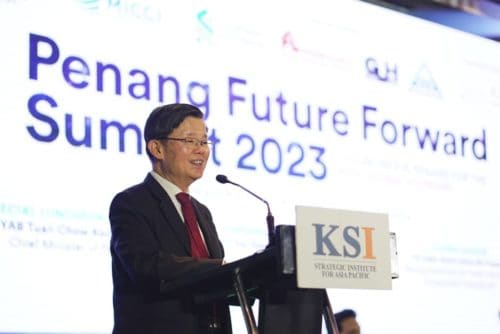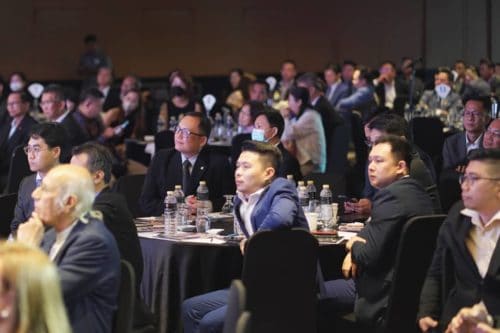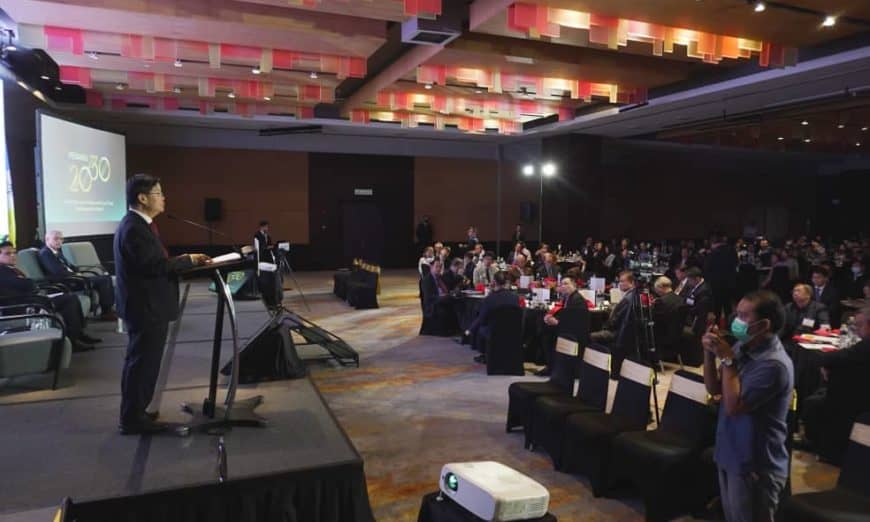PENANG is cautiously optimistic that a gradual economic recovery is on the cards as the state recovers from the impact of Covid-19.
Chief Minister Chow Kon Yeow said the state strives to meet the gross domestic product (GDP) forecast growth of 5.4% by 2025.
“As we continue to pursue the goals of Penang2030 we should not lose sight of the fact that the most important metric is the well-being of the people of Penang.
“Ultimately it is about how their daily lives are experienced.
“The Penang2030 vision is a comprehensive development plan which aimed at transforming the state into ‘A Family-Focused Green and Smart State that Inspires the Nation’,” Chow said in his special luncheon address at the Penang Future Forward Summit 2023 at G Hotel today.
The Summit, themed ‘Future Proof Penang for the New Global Economy’, was jointly organised by the KSI Strategic Institute for Asia Pacific and the Malaysia International Chamber of Commerce and Industry (Micci) Penang branch.
Chow said the Summit was apt and relevant since Malaysia has entered a new chapter of economic development under the new unity government.
“Penang businesses are also charting their trajectories for the next decade. We can bring Penang to the world and the world to Penang through this Summit,” he added.

Speaking about the public-private-people (PPP) partnerships, Chow highlighted the challenges faced by the Governments.
“Governments face an ever-increasing need to find sufficient financing to develop and maintain the infrastructure required to support growing populations.
“Governments are challenged by the demands of increasing urbanisation, the rehabilitation requirements of ageing infrastructure, the need to expand networks, and the goal of reaching previously unserved or underserved areas.
“Furthermore, with climate change, there is a greater need to combine the Government’s limited financial capacity and efforts, and to mobilise private sector capital for infrastructure investment.
“If structured correctly, a PPP partnership can mobilise untapped resources, while helping those who seek investment opportunities,” he said.
Chow also presented the Penang2030 vision.
“The Penang2030 vision was launched in 2018 as a policy framework for Penang. The vision includes four themes, 16 strategic initiatives and several catalytic projects.
“Each initiative has a series of targets which are being tracked via a dashboard.
“We are now five years into the 12-year Penang2030 vision with an overall progress of approximately 45%. In many areas, progress is well beyond that; with targets likely to be exceeded before 2030,” he said.

Chow was proud to mention that Penang’s economy is on track post-Covid-19.
“Penang recorded the highest investment from 2019 to 2021, totalling RM107.2 billion,” he said.
Earlier in his opening address, Penang Governor Tun Ahmad Fuzi Abdul Razak said the state election was coming soon, and it was his hope for the election to be held peacefully within the country’s democratic system.
He commended the state’s performances over the years.
“As a major economic hub in the region, Penang is deeply affected by the ebbs and flows of the global economy. The future of Penang and the global economy are closely intertwined, and what happens in Penang can also have ripple effects around the world.
“There has been much good news. The Penang government has done a good job raking in sizeable foreign direct investments (FDI) and the outcome was particularly good in recent years.
“This reflects the confidence that investors have towards the state. For instance, Penang has garnered a total of RM149 billion in approved manufacturing investments over the past 10 years (2012-2021). The state has managed to record some RM76 billion in 2021 alone, which was an all-time high,” Ahmad Fuzi said.
He added that the state government was fully aware of the growing importance of technology and innovation.
“Everything is being done to meet the demand for talents. Penang is investing heavily in education and training programmes including providing opportunities for lifelong learning so that its workforce will be ready for the jobs of the future,” he said.
Ahmad Fuzi believed it is useful for people to consider revisiting the idea of reviving the Penang free port status.
“The economic gains may be obvious to us all, especially business leaders gathered here, but the cultural gains, which in the long run also translate into substantial economic benefits, are even more essential to Penang’s cultural depth and affluence.
“I know some of you here may consider a call for the return to Penang’s free port status to be an outburst of nostalgia and to be far removed from what is possible.
“But what is interesting to know is that even the United Kingdom Prime Minister, Rishi Sunak, looks upon the establishment of new freeports in the UK, especially Green Freeports, as transformational in encouraging construction, private investment, and job creation.
“I believe any disadvantages associated with the establishment of a freeport can be mitigated by emulating the best practices of successful freeports worldwide, for which there are about 3,500 today, including Singapore, Hong Kong and Dubai,” he said.
Ahmad Fuzi also proposed another idea for discussion.
“The second idea that I thought would be relevant for discussion is to consider the merits of setting up a Penang Sovereign Wealth Fund.
“With the centralisation of power in the Federation, as demonstrated by the absence of local elections and in the fiscal freedom of state governments, Penang has to resort to other means to inspire the economic growth of the state.
“What all this means is that the individual states in Malaysia are left at the mercy and discretion of the Federal Government through its various agencies, for the major portion of their revenue.
“This tends to leave them preoccupied with operational matters. Long-term planning becomes a largely vain undertaking. But as with every individual household, the future of any state economy must rely on its ability to save for the future,” he said.
He added that in that context, it was significant to learn from Sarawak.
“I am aware that Sarawak’s situation is quite unlike Penang’s, but it does not hurt to dare to explore the bold policies of others, and to adopt and adapt whatever can be good for Penang in the long run.
“Just after the last General Election, the Sarawak Legislative Assembly unanimously approved the Sarawak Sovereign Wealth Future Fund Board Bill.
“The main objective of such an exercise, to quote Sarawak Premier Tan Sri Abang Johari Tun Openg, is ‘to convert non-renewable assets to financial assets, invest in the future through forced savings and secure the continued growth of financial reserves through diversified investments’.
“The key point of this is to generate income for the future without being too dependent and for the state to have the means to aid its people in education, in skills attainment and in other socioeconomic endeavours,” Ahmad Fuzi said.
He added that transparency, competency, and accountability are key to the success of such a scheme.
“It may be wise for us to focus on independence and impartiality as the definitive aspects if ever such an undertaking were to be considered,” he said.
Also present were Penang Entrepreneurial Development, Trade, and Industry Committee chairman Datuk Abdul Halim Hussain, KSI Strategic Institute for Asia Pacific deputy chairman Datuk Seri Mohamed Iqbal Rawther, KSI Strategic Institute for Asia Pacific Tan Sri Michael Yeoh, Micci vice-president Michel Van Crombrugge, and former Penang Chief Minister Tan Sri Dr Koh Tsu Koon.
Story by Christopher Tan
Pix by Siew Chia En
Video by Law Suun Ting

